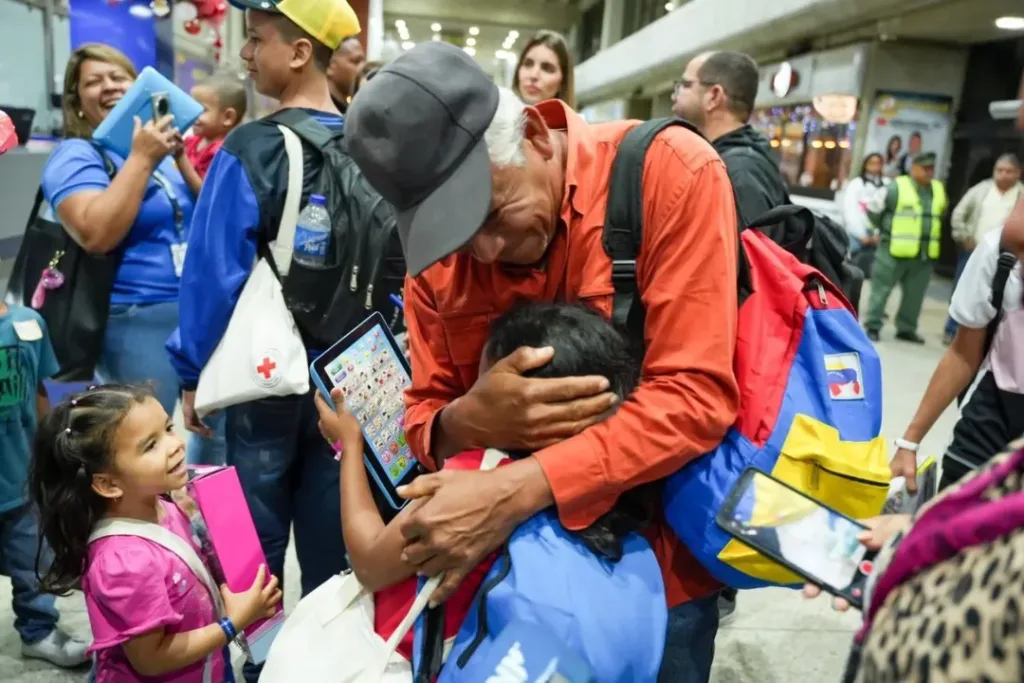
An elderly person embraces a migrant minor upon arrival in Venezuela from Colombia on Thursday, November 20, 2025. Photo: IG/@vueltalapatria.

Orinoco Tribune – News and opinion pieces about Venezuela and beyond
From Venezuela and made by Venezuelan Chavistas

An elderly person embraces a migrant minor upon arrival in Venezuela from Colombia on Thursday, November 20, 2025. Photo: IG/@vueltalapatria.
Caracas (OrinocoTribune.com)—This week, Venezuela received 383 repatriated citizens through the Return to the Homeland Plan. Three flights landed at Simón Bolívar International Airport in Maiquetía, La Guaira state.
Flight 88 arrived on Wednesday, November 19, from Phoenix, Arizona, United States, carrying 167 repatriated migrants. This group consisted of 129 men, 30 women, and eight children. It was operated by the US-based Eastern Airlines.
A second flight, numbered 89, landed on Thursday, November 20, from Colombia. This special humanitarian operation carried 16 Venezuelan children who had been separated from their parents by controversial US anti-migration policies.
The minors—Ahinoa Arias (3), Eliannys Hernandez (8), Noelismar Rojas (4), Oswell Gutierrez (1), Oriana Vazquez (17), Silviangelys Moranda (4), Alfred Rodriguez (7), Carima Pantoja (3 months), David Echezuria (6), Keisy Pantoja (3), Genesis Zerpa (16), Amaro Gonzalez (6), Mariana Azuaje (4), Emmanuel Marchan (15), Esteban Castañeda (2), and Azael Albornoz (15)—were under the custody of the Colombian Institute of Family Welfare (ICBF).
Their return occurred within the commemoration of the second anniversary of the signing of the Memorandum of Understanding on the Protection of Children, Girls, and Adolescents between Venezuela and Colombia. The airline for this flight was not specified.
Flight 90 arrived on Friday, November 21, also from Phoenix, Arizona, and was operated by Eastern Airlines. It carried 200 Venezuelans, a group composed of 163 men, 32 women, and 5 minors.
The total number of repatriated migrants now stands at 17,436. This figure reflects this year’s ongoing process, when Caracas and Washington—which have had no diplomatic relations since 2019—signed a migrant deportation agreement in February. The agreement remains in place despite unprecedented US military threats against Venezuela since August, when a US military operation was launched under the pretext of the war on drugs.
The US military operation has involved several lethal strikes on small boats in the Caribbean and the eastern Pacific, which have been labeled by United Nations experts as extrajudicial killings that violate international law. Similarly, within the US, experts and legislators have called the operation illegal. So far, the controversial operation has killed 83 civilians in the region, nationals of Venezuela, Colombia, Trinidad and Tobago, along with an Ecuadorian survivor.
Roots of the migration crisis
Most Venezuelan migrants in the US initially left after being affected by the economic crisis between 2015 and 2020, a direct consequence of illegal US sanctions against Venezuela.
Following a massive smear campaign and incidents of xenophobic violence in the US alleging Venezuelan migrants were criminals or mental health patients, the US government began detaining and deporting them. This occurred despite the majority of migrants having no criminal records and many having legal regularization procedures underway.
Aid and reintegration for returnees
Venezuelan authorities receive the repatriated migrants following the protocols of the Return to the Homeland plan. The comprehensive care provided upon arrival includes healthcare, psychological support, and legal and socioeconomic checks.
The Return to the Homeland plan was launched by the government of President Nicolás Maduro in 2018 to repatriate Venezuelans in vulnerable situations stranded abroad, free of cost. The program is aimed at assisting those who have been victims of xenophobia and exploitation to ensure their dignified and safe return. It offers comprehensive support to facilitate a successful and trauma-free reintegration into Venezuelan society.
Special for Orinoco Tribune by staff
OT/JRE/SF
Support Groundbreaking Anti-Imperialist Journalism: Stand with Orinoco Tribune!
For 7 years, we’ve delivered unwavering truth from the Global South frontline – no corporate filters, no hidden agenda.
Last year’s impact:
• More than 200K active users demanding bold perspectives
• 216 original pieces published in 2025 alone
Fuel our truth-telling: Every contribution strengthens independent media that actually challenges imperialism.
Be the difference: DONATE now to keep radical journalism alive!